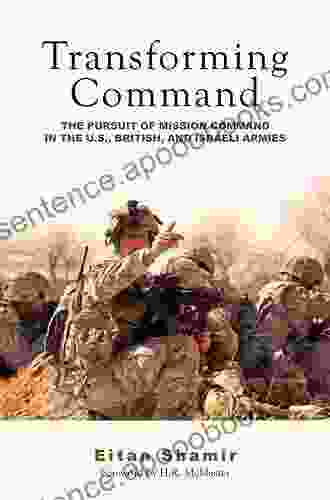The Pursuit of Mission Command in the British and Israeli Armies: A Comparative Analysis

4.6 out of 5
| Language | : | English |
| File size | : | 1088 KB |
| Text-to-Speech | : | Enabled |
| Screen Reader | : | Supported |
| Enhanced typesetting | : | Enabled |
| Word Wise | : | Enabled |
| Print length | : | 284 pages |
| Hardcover | : | 224 pages |
| Item Weight | : | 12.8 ounces |
| Dimensions | : | 6.14 x 0.51 x 9.21 inches |
| Paperback | : | 224 pages |
Mission command is a military doctrine that emphasizes the importance of giving subordinates the freedom to make decisions and take action on their own initiative. It is based on the belief that in complex and rapidly changing battlefields, it is impossible for a single commander to have all the information and time needed to make every decision. Therefore, subordinates must be empowered to make decisions and take action on their own, in accordance with their understanding of the commander's intent.
Mission command has been adopted by a number of armies around the world, including the British and Israeli armies. However, there is no single, universally accepted definition of mission command. Each army has its own unique interpretation of the doctrine, based on its own history, culture, and operational environment.
This book explores the concept of mission command in the British and Israeli armies, comparing the two approaches and their implications for military effectiveness.
British Mission Command
The British Army has a long history of emphasizing mission command. The doctrine was first developed in the 18th century by General Sir John Moore, who believed that subordinates should be given the freedom to make decisions and take action on their own initiative. Moore's ideas were further developed by General Sir Arthur Wellesley, Duke of Wellington, who led the British Army to victory in the Napoleonic Wars. Wellington believed that mission command was essential for success on the battlefield, as it allowed subordinates to adapt to changing circumstances and make decisions on the spot.
The British Army's mission command doctrine is based on a number of principles, including:
- Clarity of intent: The commander must clearly communicate his intent to his subordinates, so that they can understand what he wants them to achieve.
- Freedom of action: Subordinates must be given the freedom to make decisions and take action on their own initiative, in accordance with their understanding of the commander's intent.
- Responsibility: Subordinates are responsible for their own actions, and they must be held accountable for the results.
The British Army's mission command doctrine has been used successfully in a number of conflicts, including the Napoleonic Wars, the Second Boer War, and the two World Wars. However, it has also been criticized for being too decentralized and for giving subordinates too much freedom to act. In recent years, the British Army has made some changes to its mission command doctrine, in Free Download to address these criticisms.
Israeli Mission Command
The Israeli Defense Forces (IDF) adopted mission command in the late 1970s, after the Yom Kippur War. The IDF was impressed by the success of the US Army's mission command doctrine in the Vietnam War, and it believed that a similar approach could help it to improve its own performance on the battlefield.
The IDF's mission command doctrine is based on a number of principles, including:
- Centralized planning, decentralized execution: The commander develops the plan, but subordinates are responsible for executing it. This allows subordinates to adapt to changing circumstances and make decisions on the spot.
- Mission-type Free Downloads: The commander issues mission-type Free Downloads, which give subordinates the freedom to decide how to achieve the mission. This allows subordinates to use their own creativity and initiative.
- Feedback: The commander provides feedback to subordinates on their performance, so that they can learn from their mistakes and improve their skills.
The IDF's mission command doctrine has been used successfully in a number of conflicts, including the 1982 Lebanon War, the 2006 Lebanon War, and the 2014 Gaza War. However, it has also been criticized for being too centralized and for giving subordinates too little freedom to act. In recent years, the IDF has made some changes to its mission command doctrine, in Free Download to address these criticisms.
Comparison of British and Israeli Mission Command
The British and Israeli armies have different approaches to mission command, but they share a number of common principles. Both armies believe that giving subordinates the freedom to make decisions and take action on their own initiative is essential for success on the battlefield. However, there are some key differences between the two approaches.
One key difference is the level of centralization. The British Army's mission command doctrine is more decentralized than the IDF's mission command doctrine. This means that British subordinates have more freedom to make decisions and take action on their own initiative. The IDF's mission command doctrine is more centralized, which means that the commander has more control over the execution of the plan.
Another key difference is the way that Free Downloads are issued. The British Army issues clear and detailed Free Downloads, which leave little room for interpretation. The IDF issues mission-type Free Downloads, which give subordinates more freedom to decide how to achieve the mission. This allows subordinates to use their own creativity and initiative.
Finally, the British Army and the IDF have different cultures. The British Army is a more traditional army, with a strong emphasis on hierarchy and discipline. The IDF is a more informal army, with a strong emphasis on teamwork and innovation.
These differences in centralization, Free Downloads, and culture have a significant impact on the way that mission command is practiced in the British and Israeli armies. The British Army's approach is more decentralized and formal, while the IDF's approach is more centralized and informal. Both approaches have their own strengths and weaknesses, and the best approach for a particular army will depend on its own history, culture, and operational environment.
Implications for Military Effectiveness
Mission command has a number of implications for military effectiveness. First, it allows subordinates to make decisions and take action on their own initiative, which can lead to faster and more effective decision-making. Second, it allows subordinates to adapt to changing circumstances, which can be critical in complex and rapidly changing battlefields. Third, it can help to develop subordinates' leadership skills, as they are given the opportunity to make decisions and take responsibility for their actions.
However, mission command can also have some negative implications for military effectiveness. First, it can lead to a lack of coordination, as subordinates may make decisions that are not in line with the commander's intent. Second, it can lead to a lack of discipline, as subordinates may be more likely to disobey Free Downloads if they believe that they have a better plan. Third, it can lead to a lack of accountability, as subordinates may be less likely to be held responsible for their actions if they believe that they were acting on their own initiative.
The key to successful mission command is to find the right balance between freedom and control. Subordinates need to be given enough freedom to make decisions and take action on their own initiative, but they also need to be held accountable for their actions. The commander must also be able to provide clear and concise guidance, so that subordinates understand what he wants them to achieve.
Mission command is a complex and challenging doctrine, but it can be a powerful tool for military effectiveness. When implemented successfully, mission command can help to improve decision-making, adaptation, and leadership. However, it is important to remember that mission command is not a panacea, and it must be implemented carefully and in accordance with the army's own history, culture, and operational environment.
4.6 out of 5
| Language | : | English |
| File size | : | 1088 KB |
| Text-to-Speech | : | Enabled |
| Screen Reader | : | Supported |
| Enhanced typesetting | : | Enabled |
| Word Wise | : | Enabled |
| Print length | : | 284 pages |
| Hardcover | : | 224 pages |
| Item Weight | : | 12.8 ounces |
| Dimensions | : | 6.14 x 0.51 x 9.21 inches |
| Paperback | : | 224 pages |
Do you want to contribute by writing guest posts on this blog?
Please contact us and send us a resume of previous articles that you have written.
 Book
Book Novel
Novel Page
Page Chapter
Chapter Text
Text Story
Story Genre
Genre Reader
Reader Library
Library Paperback
Paperback E-book
E-book Magazine
Magazine Newspaper
Newspaper Paragraph
Paragraph Sentence
Sentence Bookmark
Bookmark Shelf
Shelf Glossary
Glossary Bibliography
Bibliography Foreword
Foreword Preface
Preface Synopsis
Synopsis Annotation
Annotation Footnote
Footnote Manuscript
Manuscript Scroll
Scroll Codex
Codex Tome
Tome Bestseller
Bestseller Classics
Classics Library card
Library card Narrative
Narrative Biography
Biography Autobiography
Autobiography Memoir
Memoir Reference
Reference Encyclopedia
Encyclopedia Adam Jones
Adam Jones Ella Quinn
Ella Quinn Rob Harrell
Rob Harrell Charles Love
Charles Love Marj Gurasich
Marj Gurasich Benjamin Hebblethwaite
Benjamin Hebblethwaite Samuel Pepys
Samuel Pepys Fred Bolder
Fred Bolder Janka Neumann
Janka Neumann Tomas Transtromer
Tomas Transtromer Dustin Hartley
Dustin Hartley Emma Finn
Emma Finn Rupert Wegerif
Rupert Wegerif Liam Quirk
Liam Quirk Emma Mcgann
Emma Mcgann Deborah Brown
Deborah Brown Elisabet Salas
Elisabet Salas Charles Colcock Jones
Charles Colcock Jones Elizabeth Gillan Muir
Elizabeth Gillan Muir Ross Cole
Ross Cole
Light bulbAdvertise smarter! Our strategic ad space ensures maximum exposure. Reserve your spot today!
 Branson CarterFollow ·10k
Branson CarterFollow ·10k Zachary CoxFollow ·5.5k
Zachary CoxFollow ·5.5k Alex ReedFollow ·3.8k
Alex ReedFollow ·3.8k Corey HayesFollow ·7.9k
Corey HayesFollow ·7.9k Michael CrichtonFollow ·19.8k
Michael CrichtonFollow ·19.8k Nathaniel PowellFollow ·16.2k
Nathaniel PowellFollow ·16.2k Galen PowellFollow ·14.7k
Galen PowellFollow ·14.7k Edwin BlairFollow ·17.3k
Edwin BlairFollow ·17.3k

 Julian Powell
Julian PowellShetland Pony: Comprehensive Coverage of All Aspects of...
The Shetland...

 Cason Cox
Cason CoxHow Anaesthetics Changed the World: A Medical Revolution...
Imagine a world where surgery is an...

 Harold Powell
Harold PowellUnleash Your Inner Songwriter: The Ultimate Guide for...
Calling all aspiring songwriters!...

 Nikolai Gogol
Nikolai GogolUnleash Your Artistic Potential: Quick Draw Anatomy for...
In the dynamic and visually...

 Tim Reed
Tim ReedThe Rock 'n' Roll Life of Legendary Sax Man Bobby Keys
The Rock 'n' Roll Life...

 Damon Hayes
Damon HayesMoney Management Activities for Youth: A Guide to...
In an era marked by rapidly...
4.6 out of 5
| Language | : | English |
| File size | : | 1088 KB |
| Text-to-Speech | : | Enabled |
| Screen Reader | : | Supported |
| Enhanced typesetting | : | Enabled |
| Word Wise | : | Enabled |
| Print length | : | 284 pages |
| Hardcover | : | 224 pages |
| Item Weight | : | 12.8 ounces |
| Dimensions | : | 6.14 x 0.51 x 9.21 inches |
| Paperback | : | 224 pages |











